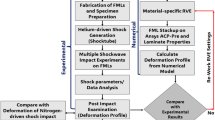Abstract
Early in the shuttle Columbia crash investigation, item 33767 was one of several “Pathfinder” components selected from the Columbia debris that exhibited damage patterns similar to those observed on the left wing airframe components, the components in which initial failure was thought to have occurred. “Pathfinder Analysis” sought to answer academic questions regarding the maximum heat attained and heating direction/duration and identify debris imposed on this fuselage section during Columbia breakup and re-entry. Traditional failure analysis techniques provided useful information on debris constituents and damage sequence and were successful in identifying heat effects, such as the presence of large thermal gradients across the component, and the existence of several failure modes that included hot tensile failure, hot bending failure, and rapid overload fracture.
Similar content being viewed by others
Author information
Authors and Affiliations
Additional information
This article is based on a presentation given on October 19, 2004, at the session on “The Space Shuttle Columbia: A Forensic Materials Perspective” as part of the Failure Analysis and Prevention Symposium at ASM International’s Materials Solutions Conference and Exposition in Columbus, Ohio.
Rights and permissions
About this article
Cite this article
DeVries, P. Columbia accident investigation board (CAIB) pathfinder analysis of item 33767. J Fail. Anal. and Preven. 6, 92–100 (2006). https://doi.org/10.1361/154770206X86581
Received:
Revised:
Issue Date:
DOI: https://doi.org/10.1361/154770206X86581




